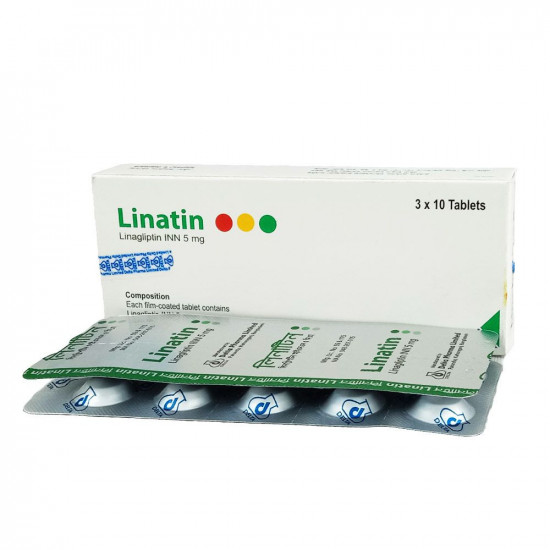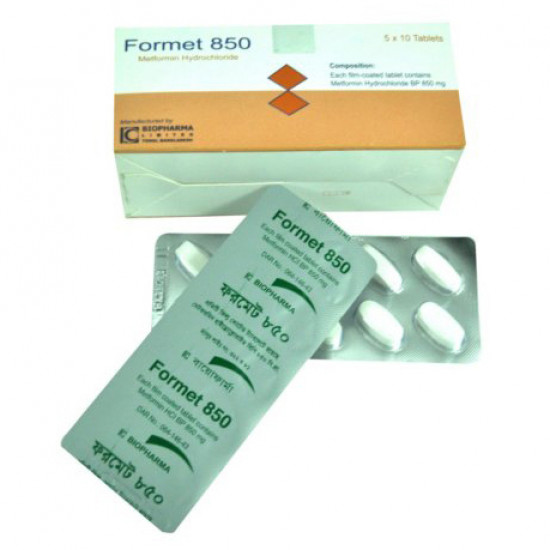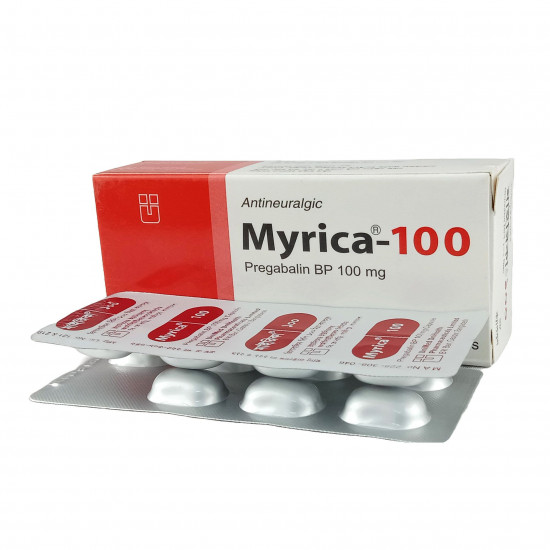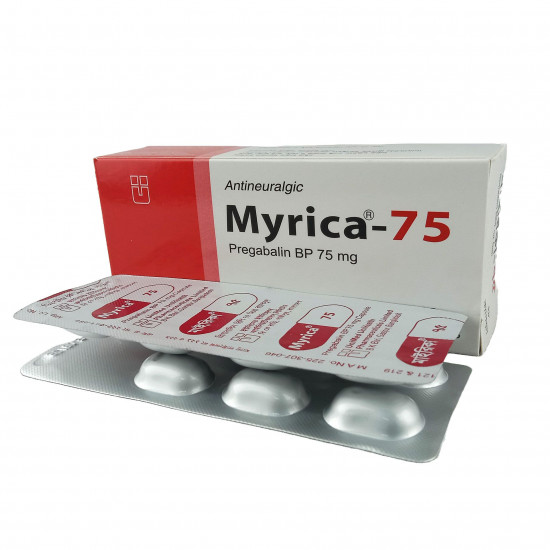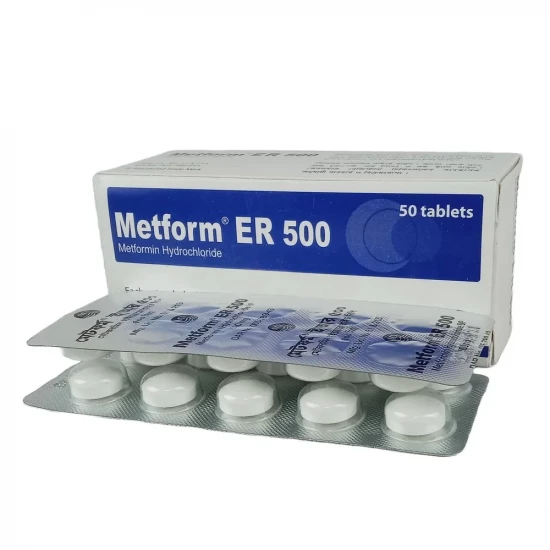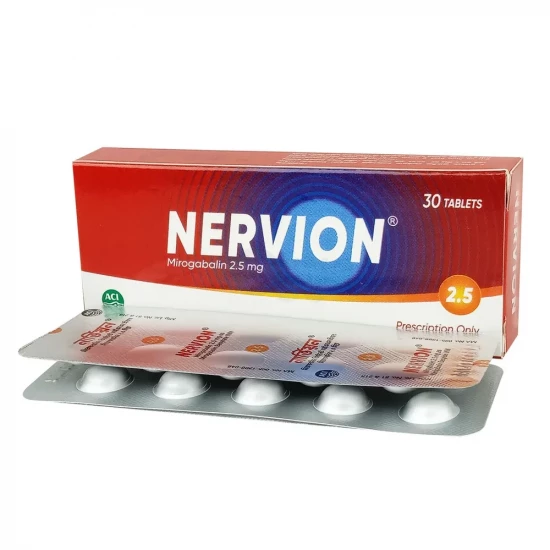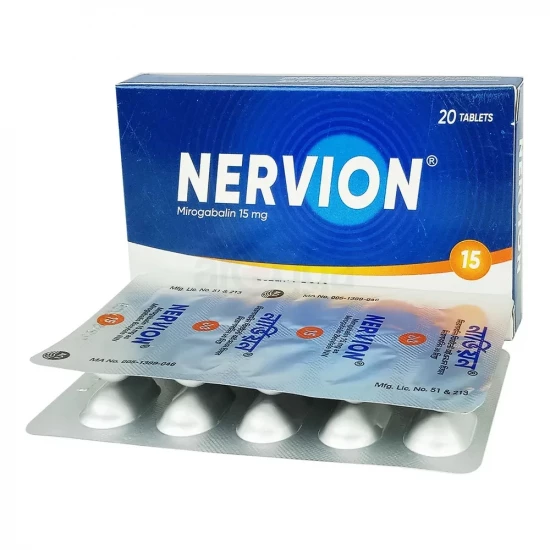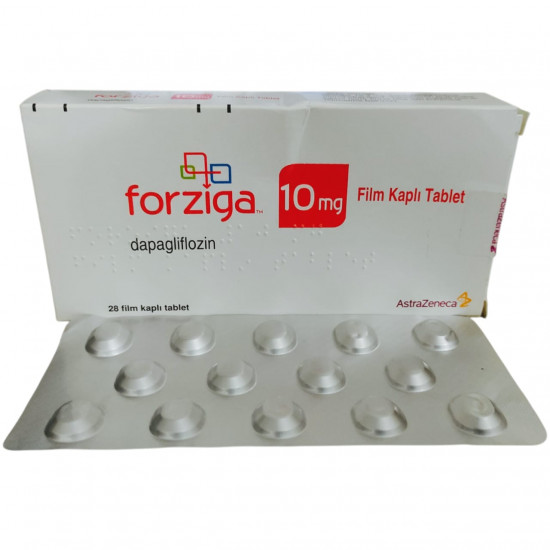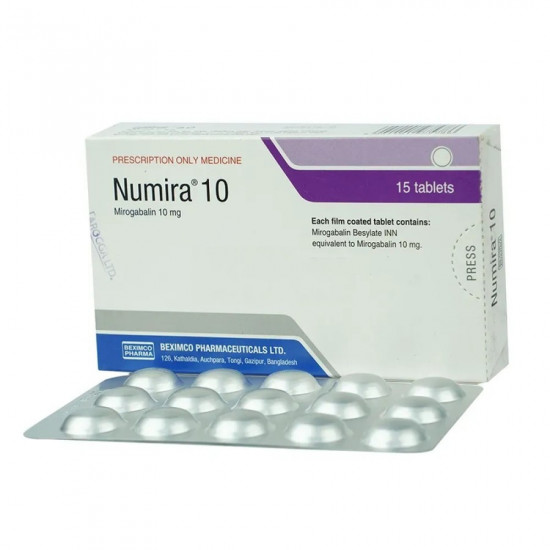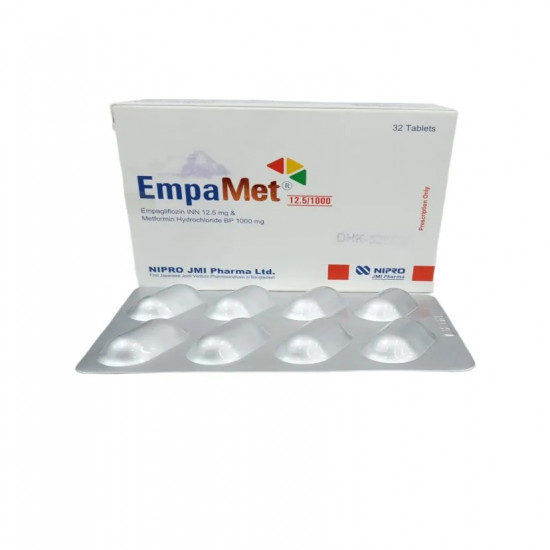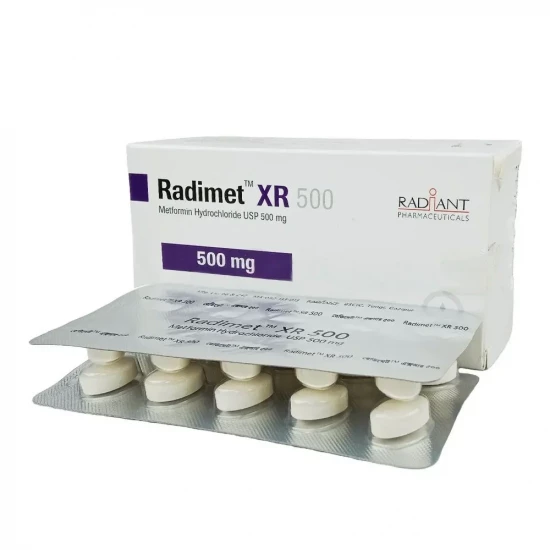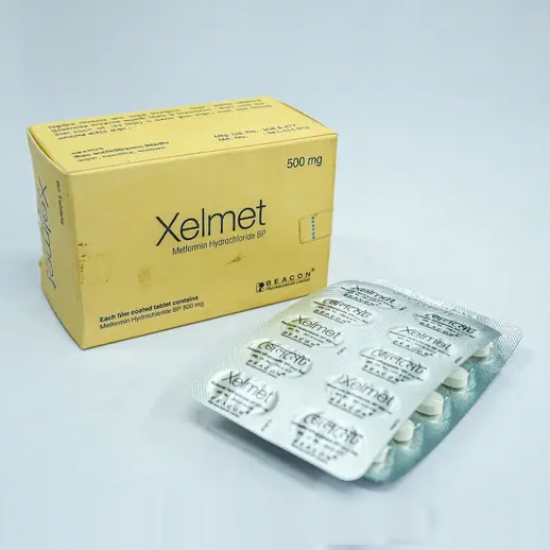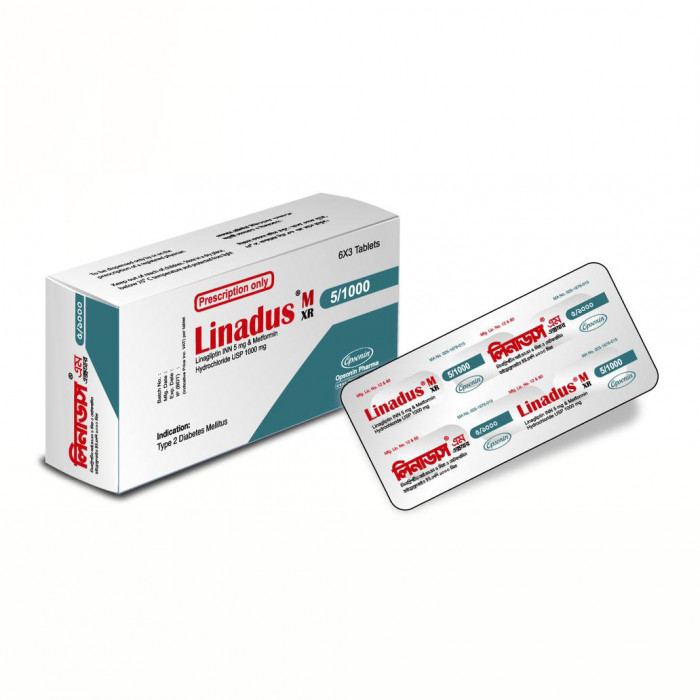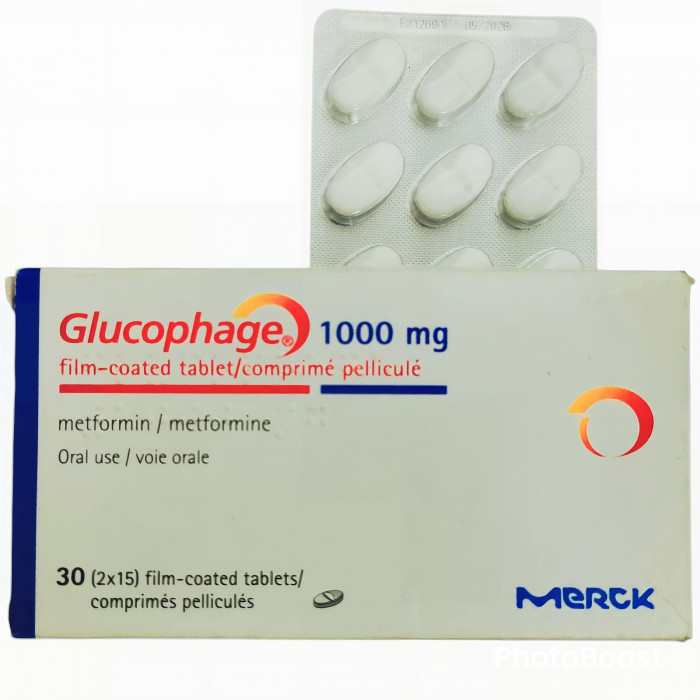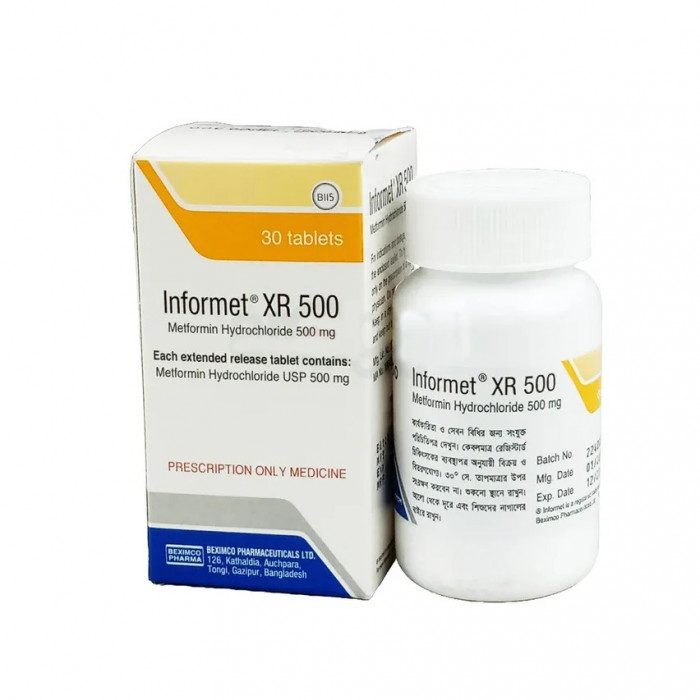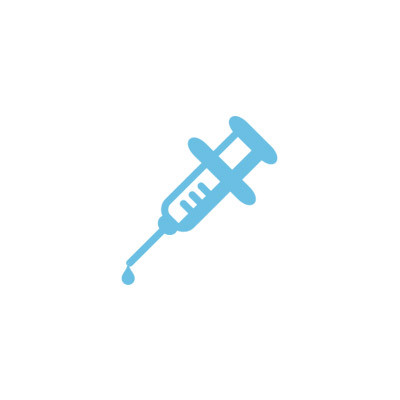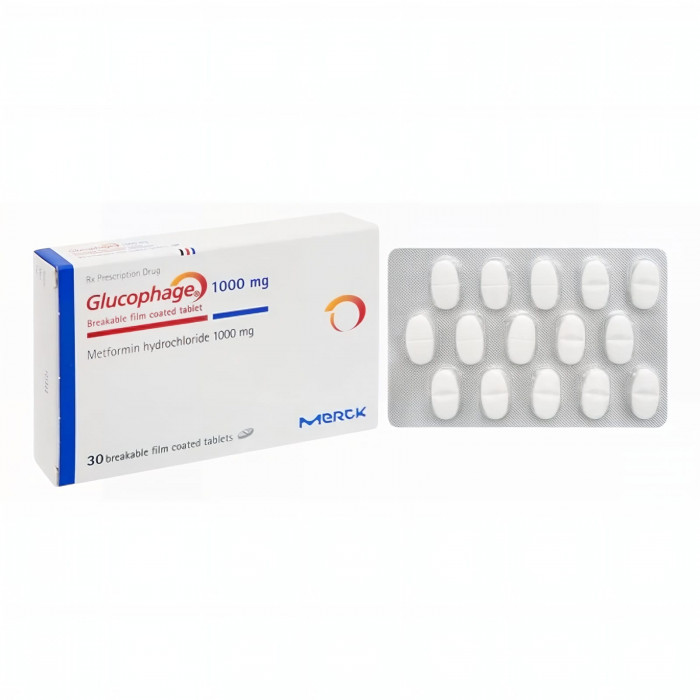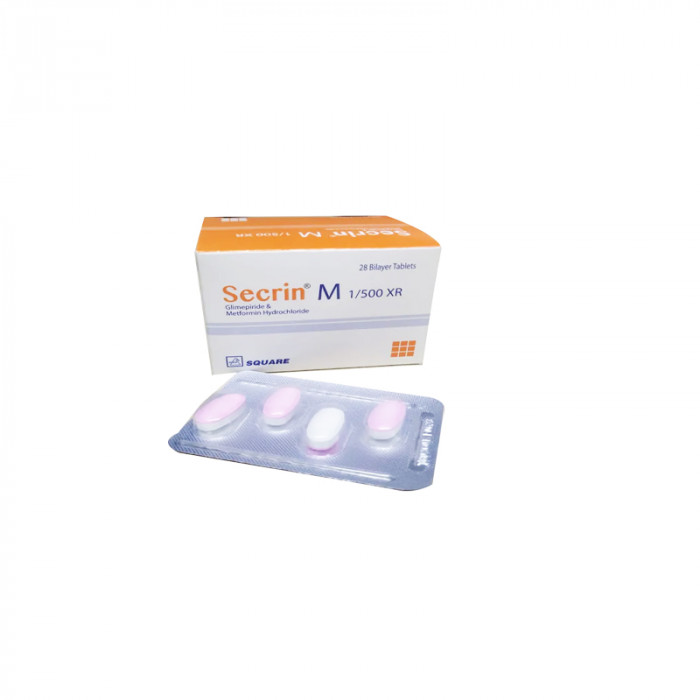
✔ 100% Authentic Product
👁️ Currently Viewing 1199
✅ Description:
Indications
In type 2 diabetes mellitus patients, this tablet is used as a supplement to diet and exercise if glimepiride or metformin alone does not provide appropriate glycemic control.
Glimepiride and metformin as a combined therapy have been discontinued.
Pharmacology
Glimepiride is a sulfonylurea antidiabetic drug that lowers blood glucose levels. Glimepiride's principal mode of action appears to be dependent on increasing insulin secretion from functional pancreatic beta cells. Glimepiride works in tandem with glucose to improve beta cell sensitivity to a physiological glucose stimulation, which leads to insulin production. Glimepiride's activity may also be influenced by extrapancreatic effects such as reduced basal hepatic glucose production, improved peripheral tissue insulin sensitivity, and glucose uptake.A single dose of Glimepiride has a 24-hour hypoglycaemic effect in non-fasting diabetic patients.
Metformin Hydrochloride is an antihyperglycemic medication of the biguanide class that is used to treat type 2 diabetes. Both baseline and postprandial plasma glucose levels are reduced. It has a different mode of action than sulfonylureas and does not cause hypoglycemia. Metformin Hydrochloride reduces hepatic glucose synthesis, intestinal glucose absorption, and insulin sensitivity by increasing peripheral glucose uptake and utilization.
Dosage
The dosage of this tablet is governed by the desired blood glucose level. The dosage of this tablet must be the lowest which is sufficient to achieve the desired metabolic control. During treatment with this tablet glucose levels in blood and urine must be measured regularly.
Mistakes, e.g. forgetting to take a dose, must never be corrected by subsequently taking a larger dose.
As an improvement in control of diabetes is, in itself, associated with higher insulin sensitivity, glimepiride requirements may fall as treatment proceeds. To avoid hypoglycaemia timely dose reduction or cessation of this tablet therapy must therefore be considered.
The highest recommended dose per day should be 8 mg of glimepiride and 2000 mg of metformin.
In order to avoid hypoglycaemia the starting dose of this tablet should not exceed the daily doses of glimepiride or metformin already being taken.
When switching from combination therapy of glimepiride plus metformin as separate tablets, this combination should be administered on the basis of dosage currently being taken.
Administration
This tablet should not be crushed or chewed and should be swallowed whole.
Interaction
Based on experience with Glimepiride and known interactions for other sulfonylureas, the following interactions must be considered. In addition to insulin and other oral antidiabetic agents, drugs which may potentiate the hypoglycaemic action of Glimepiride include: ACE inhibitors, aminosalicylic acid, anabolic steroids and male sex hormones, azapropazone, chloramphenicol, clofibrate, coumarin derivatives, cyclophosphamide, disopyramide, fenfluramine, fenyramidol, fibrates, fluconazole, fluoxetine, guanethidine, ifosfamide, MAO-inhibitors, miconazole, oxpentifylline (high dose parenteral), oxyphenbutazone, para-aminosalicylic acid, phenylbutazone, probenecid, quinolones, salicylates, sulphinpyrazone, sulfonamide antibiotics, tetracyclines, tritoqualine, trofosfamide. Drugs which may attenuate the hypoglycaemic action of Glimepiride include: acetazolamide, barbiturates, calcium channel blockers, corticosteroids, diazoxide, diuretics, glucagon, isoniazid, laxatives, nicotinic acid (high doses), oestrogens, phenothiazines, phenytoin, progestogens, rifampicin, sympathomimetic agents, thyroid hormones. H2 receptor antagonists, beta-blockers, clonidine and reserpine may lead to either potentiation or weakening of the blood-glucose-lowering effect. Concomitant treatment with a beta-receptor blocker, clonidine, guanethidine or reserpine may mask the warning symptoms of a hypoglycemic attack. Acute and chronic alcohol intake may either potentiate or attenuate the activity of Glimepiride in an unpredictable fashion.
Metformin: Increased risk of lactic acidosis in acute alcohol intoxication, particularly in case of fasting or malnutrition and hepatic insufficiency. Avoid consumption of alcohol and alcohol-containing medications. Intravascular administration of iodinated contrast agents may lead to renal failure, resulting in metformin accumulation and a risk of lactic acidosis.
Contraindications
Glimepiride-
In patients hypersensitive to glimepiride, metformin, other sulfonylureas, other sulfonamides, or any of the excipients of Amaryl M.
In pregnant women.
In breastfeeding women.
No experience has been gained concerning the use of glimepiride in patients with severe impairment of liver function and in dialysis patients. In patients with severe impairment of hepatic function, change-over to insulin is indicated, not least to achieve optimal metabolic control.
Metformin-
Hypersensitivity to metformin or any of the excipients.
Any type of acute metabolic acidosis such as lactic acidosis Diabetic ketoacidosis, diabetic pre-coma.
Severe Renal failure or renal disfunction (e.g., serum creatine levels >135 μmol/L in males and >110 μmol/L in females), GFR < 30 mL/min.
Acute conditions with the potential to alter renal function such as Dehydration, severe infection, intravascular administration of iodinated contrast agents etc.
Acute or chronic disease which may cause tissue hypoxia such as cardiac or respiratory failure, recent myocardial infarction, shock
Hepatic insufciency.
Acute alcohol intoxication, alcoholism.
Lactation.
Side Effects
As a result of the blood glucose-lowering action of Glimepiride, hypoglycemia may occur which may also be prolonged. At the start of treatment, there may be temporary visual impairment due to the change in blood glucose levels. Occasionally, gastrointestinal symptoms e.g. nausea, vomiting, sensations of pressure or fullness in the epigastrium, abdominal pain and diarrhoea may occur. Occasionally, allergic or pseudo-allergic reactions may occur e.g. in the form of itching, urticaria or rashes. Metformin: Gastrointestinal symptoms-nausea, vomiting, diarrhoea, abdominal pain and loss of appetite are very common. Metallic taste is common. A decrease of vitamin B12 absorption with decrease of serum levels has been observed in patients treated long-term with metformin. Lactic acidosis is very rare.
Pregnancy & Lactation
Pregnancy: The use of Glimepiride + Metformin combination is not recommended for use in pregnancy. Intake may cause risk/harm to child. It is recommended that such patients change over to insulin.
Lactation: The use of Glimepiride + Metformin combination is not recommended for use in lactating mothers, and if the diet alone is inadequate for controlling blood glucose, insulin therapy should be considered.
Pediatric use: Safety and effectiveness of Glimepiride + Metformin combination in pediatric patients have not been established.
Geriatric use: Metformin is substantially excreted by the kidneys, and because aging is associated with reduced renal function, Glimepiride + Metformin combination should be used with caution in the elderly.
Precautions & Warnings
Metformin: Lactic acidosis is a rare but serious (high mortality in the absence of prompt treatment), complication of Metformin accumulation which can be fatal. Patients should be cautioned about prolonged fasting and excessive alcohol intake since it potentiates the effects of Metformin on lactate metabolism. It is not recommended in hepatic/renal impairment or hypoxic states. As intravascular administration of iodinated contrast materials in radiologic studies can lead to renal failure, Metformin should be discontinued temporarily.
Glimepiride: In the initial weeks of treatment, the risk of hypoglycemia may be increased and careful monitoring is necessary. In exceptional stress situations (e.g. trauma, surgery, febrile infections), blood glucose regulation may deteriorate and a temporary change to insulin may be necessary to maintain good metabolic control.
Storage Conditions
Store at 25°C. Protect from light and high humidity. Keep out of the reach of children.
⚠️Disclaimer:
At ePharma, we’re committed to providing accurate and accessible health information. However, all content is intended for informational purposes only and should not replace medical advice from a qualified physician. Please consult your healthcare provider for personalized guidance. We aim to support, not substitute, the doctor-patient relationship.




